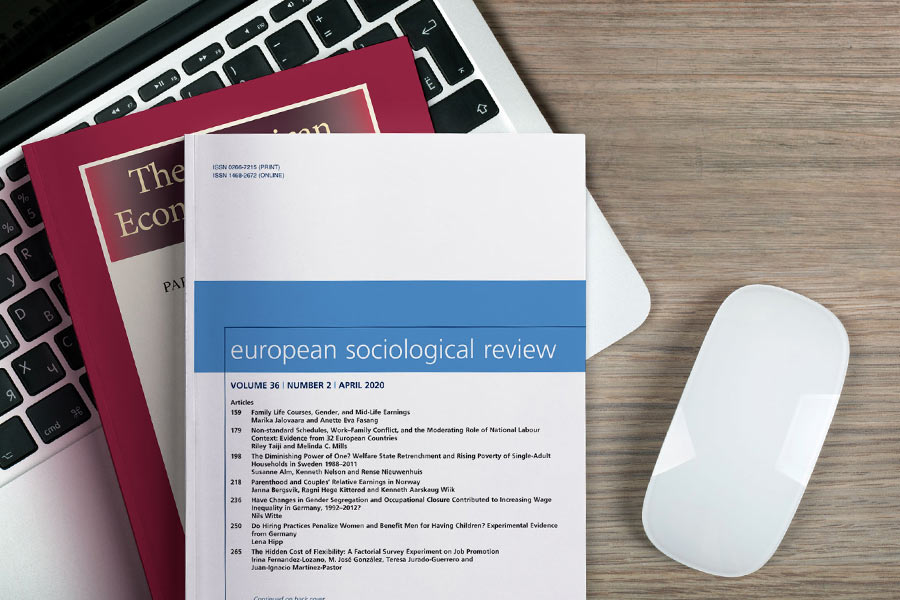Total hits 17.459
-
Regional Cultural Diversity and Firm Innovation: Important Effects of Heterogeneity or Merely Sorting?
Niebuhr, A. & Peters, J. (2025): Regional Cultural Diversity and Firm Innovation: Important Effects of Heterogeneity or Merely Sorting? In: M. Andersson, C. Karlsson & S. Wixe (Eds.) (2025): The Oxford Handbook of Spatial Diversity and Business Economics, p. 317-343. DOI:10.1093/oxfordhb/9780198866190.013.0013
-
Ein offener Blick auf Erwerbsverläufe und auf sehr vieles andere
Keitel, C.; Roth, D. (porträtierte Person) (2025): Ein offener Blick auf Erwerbsverläufe und auf sehr vieles andere. In: IAB-Forum No. 21.07.2025. DOI:10.48720/IAB.FOO.20250721.01
-
Fixed-term employment contracts: No negative wage effects in the transition to temporary employment
Hohendanner, C. & Latner, J. (2025): Befristete Arbeitsverträge: Keine negativen Lohneffekte beim Übergang in befristete Beschäftigung. (IAB-Kurzbericht 13/2025 (de)), Nürnberg, 8 p. DOI:10.48720/IAB.KB.2513
-
Fixed-term employment contracts: No negative wage effects in the transition to temporary employment
Hohendanner, C. & Latner, J. (2025): Fixed-term employment contracts: No negative wage effects in the transition to temporary employment. (IAB-Kurzbericht 13/2025 (en)), Nürnberg, 8 p. DOI:10.48720/IAB.KB.2513.en
-
The Micro and Macro Effects of Changes in the Potential Benefit Duration
Jessen, J., Jessen, R., Gałecka-Burdziak, E., Góra, M. & Kluve, J. (2025): The Micro and Macro Effects of Changes in the Potential Benefit Duration. In: The Review of Economic Studies, p. 1-37. DOI:10.1093/restud/rdaf056
-
IAB-Politikbrief Ausgabe Juli 2025
Arntz, M., Bähr, S., Bernhard, S., Braun, W., Bruckmeier, K., Burkert, C., Fitzenberger PhD, B., Hohendanner, C., Köppen, M., Kubis, A., Lietzmann, T., Matthes, B., Mense, A., Osiander, C., Prümer, S., Ramos Lobato, P., Sommer, M., Stegmaier, J., Wanger, S., Weber, E., Weik, J., Wiemers, J., Wolf, K. & Wolf, M. (2025): IAB-Politikbrief Ausgabe Juli 2025. (IAB-Politikbrief), Nürnberg, 18 p.
-
Exploring integration and migration dynamics: the research potentials of a large-scale longitudinal household study of refugees in Germany
Brücker, H., Kosyakova, Y., Rother, N., Zinn, S., Liebau, E., Gider, W., Schwanhäuser, S. & Siegert, M. (2025): Exploring integration and migration dynamics: the research potentials of a large-scale longitudinal household study of refugees in Germany. In: European Sociological Review. DOI:10.1093/esr/jcaf032
-
Immigrant–native pay gap driven by lack of access to high-paying jobs
Hermansen, A., Penner, A., Boza, I., Elvira, M., Godechot, O., Hällsten, M., Henriksen, L., Hou, F., Lippényi, Z., Petersen, T., Reichelt, M., Sabanci, H., Safi, M., Tomaskovic-Devey, D. & Vickstrom, E. (2025): Immigrant–native pay gap driven by lack of access to high-paying jobs. In: Nature, Vol. 644, No. 8078, p. 969-975. DOI:10.1038/s41586-025-09259-6
-
Der Bezug von Grundsicherungsleistungen geht auch längerfristig mit einer geringeren Lebenszufriedenheit einher (Serie „Befunde aus der IAB-Grundsicherungsforschung 2021 bis 2024“)
Nivorozhkin, A. & Promberger, M. (2025): Der Bezug von Grundsicherungsleistungen geht auch längerfristig mit einer geringeren Lebenszufriedenheit einher (Serie „Befunde aus der IAB-Grundsicherungsforschung 2021 bis 2024“). In: IAB-Forum No. 16.07.2025. DOI:10.48720/IAB.FOO.20250716.01
-
Reformen der Hinzuverdienstmöglichkeiten bei Bürgergeld, Wohngeld und Kinderzuschlag: ein Balanceakt zwischen vielen Zielkonflikten (Serie „Befunde aus der IAB-Grundsicherungsforschung 2021 bis 2024“)
Wiemers, J., Bruckmeier, K. & Sommer, M. (2025): Reformen der Hinzuverdienstmöglichkeiten bei Bürgergeld, Wohngeld und Kinderzuschlag: ein Balanceakt zwischen vielen Zielkonflikten (Serie „Befunde aus der IAB-Grundsicherungsforschung 2021 bis 2024“). In: IAB-Forum No. 15.07.2025. DOI:10.48720/IAB.FOO.20250715.01
-
Möglichkeiten und Grenzen von Kompetenzfeststellungsverfahren (Serie „Befunde aus der IAB-Grundsicherungsforschung 2021 bis 2024“)
Kawalec, S., Promberger, M. & Bähr, H. (2025): Möglichkeiten und Grenzen von Kompetenzfeststellungsverfahren (Serie „Befunde aus der IAB-Grundsicherungsforschung 2021 bis 2024“). In: IAB-Forum No. 14.07.2025. DOI:10.48720/IAB.FOO.20250714.01
-
Germany as a stopover? Insights into return and International Mobility Panel of Migrants in Germany (IMPa)
Kosyakova, Y., Olbrich, L., Gallegos Torres, K., Hammer, L., Koch, T. & Wagner, S. (2025): Germany as a stopover? Insights into return and International Mobility Panel of Migrants in Germany (IMPa). (IAB-Forschungsbericht 15/2025 (en)), Nürnberg, 92 p. DOI:10.48720/IAB.FB.2515en
-
Children of Immigrants Longitudinal Survey in Four European Countries - Germany verknüpft mit administrativen Daten des IAB (CILS4EU-DE-ADIAB) 1975-2023
Antoni, M., Dollmann, J., Schmucker, A. & Weißmann, M. (2025): Children of Immigrants Longitudinal Survey in Four European Countries - Germany verknüpft mit administrativen Daten des IAB (CILS4EU-DE-ADIAB) 1975-2023. (FDZ-Datenreport 05/2025 (de)), 86 p. DOI:10.5164/IAB.FDZD.2505.de.v1
-
Sanktionen in der Grundsicherung: Ausgewählte Forschungsergebnisse aus Veröffentlichungen der Jahre 2021 bis 2024 im Überblick (Serie „Befunde aus der IAB-Grundsicherungsforschung 2021 bis 2024“)
Knize, V., Wolf, M. & Wolff, J. (2025): Sanktionen in der Grundsicherung: Ausgewählte Forschungsergebnisse aus Veröffentlichungen der Jahre 2021 bis 2024 im Überblick (Serie „Befunde aus der IAB-Grundsicherungsforschung 2021 bis 2024“). In: IAB-Forum No. 10.07.2025. DOI:10.48720/IAB.FOO.20250710.01
-
Schwieriger Weg raus aus der Stütze: Nicht alle Betriebe bieten gute Chancen auf eine stabile Beschäftigung
Hohendanner, C. & Bernhard, S. (2025): Schwieriger Weg raus aus der Stütze: Nicht alle Betriebe bieten gute Chancen auf eine stabile Beschäftigung. In: IAB-Forum No. 09.07.2025. DOI:10.48720/IAB.FOO.20250709.01
-
Increasing Flexibilization of Working Time: Record High of 473 Million Hours in Short-Time Work Accounts
Hartl, T., Wanger, S., Warning, A. & Weber, E. (2025): Zunehmende Flexibilisierung der Arbeitszeit: Höchststand von 473 Millionen Stunden auf Kurzzeitkonten. (IAB-Kurzbericht 12/2025), Nürnberg, 8 p. DOI:10.48720/IAB.KB.2512
-
Die Berufsberatung im Erwerbsleben kann Frauen bei der Rückkehr in den Beruf unterstützen
Hartosch, K., Heuer, L., Heusler, A., Lang, J. & Ulrich, A. (2025): Die Berufsberatung im Erwerbsleben kann Frauen bei der Rückkehr in den Beruf unterstützen. In: IAB-Forum No. 07.07.2025. DOI:10.48720/IAB.FOO.20250707.01
-
Immigration monitor June
Brücker, H., Hauptmann, A. & Keita, S. (2025): Zuwanderungsmonitor Juni. (Institut für Arbeitsmarkt- und Berufsforschung. Aktuelle Daten und Indikatoren), Nürnberg, 8 p. DOI:10.48720/IAB.ZM.2506
-
Family Formation and Occupational Status: Premium or Penalties for Women?
Ehab, M. (2025): Family Formation and Occupational Status: Premium or Penalties for Women? In: Research in Social Stratification and Mobility, Vol. 99. DOI:10.1016/j.rssm.2025.101075
-
Political alienation among basic income support recipients in Germany: the role of social exclusion and experiences with welfare state institutions
Teichler, N. & Gundert, S. (2025): Political alienation among basic income support recipients in Germany: the role of social exclusion and experiences with welfare state institutions. In: Journal of Social Policy, p. 1-20. DOI:10.1017/S0047279425100913



